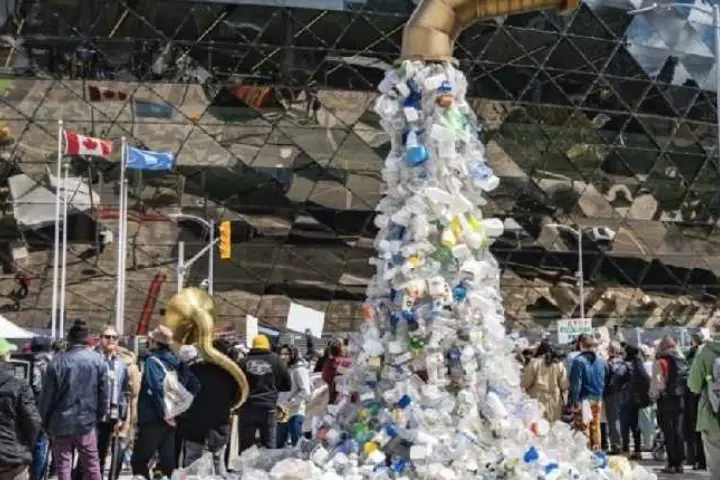Negotiators from 176 countries gathered this week for the fourth session of the Intergovernmental Negotiating Committee in Ottawa, Canada to advance the development of a global agreement by the end of 2024 to develop an international legally binding instrument on plastic pollution, including the marine environment. Will gather. ,
In a message on Earth Day, which falls on April 22, UN Secretary-General Antonio Guterres says: “Plastic knows no limits. Plastic and its production harms every living creature and every part of the planet. To defeat plastic pollution, we need a strong plastics treaty that upholds human rights and addresses the full life cycle of plastics.
According to the United Nations Environment Program (UNEP), which is hosting the talks from April 23 to 29, representatives from 174 countries are in the Canadian capital for the fourth session of the Intergovernmental Negotiating Committee for Development to discuss the next round. Expected to gather. An international legally binding instrument on plastic pollution, including the marine environment (INC-4).
It is the final meeting before talks are expected to end later this year.
According to Greenpeace Canada, a global plastics treaty has the potential to stop the plastic pollution crisis at the source – if governments really step up and live up to their responsibilities to people, the environment, wildlife and the climate. Ambition should be more than just words.
Plastic production and waste will triple by 2060, and 37 million metric tons of plastic pollution could enter the oceans each year by 2040. This is leaving a legacy of environmental impacts for future generations.
According to summit host Canada, plastic pollution causes losses of more than $2 trillion every year, with the burden largely falling on local communities. Without new and effective control measures and increased international cooperation, the global plastic pollution crisis will deepen.
During the conference, the Canadian delegation, led by Environment and Climate Change Minister Steven Guilbault, will meet with international partners from around the world to help align and raise ambition to address plastic pollution.
INC-4 is the fourth of five sessions coordinated by the United Nations Environment Programme. INC-4 represents the last moment to unite the world around a common goal to end plastic pollution.
Canada is kicking off the season with a series of events organized in partnership with the World Wildlife Fund.
Negotiating sessions will begin on April 23, where countries will continue to work through possible scope, wording and mechanisms, including financial instruments, to be included in the new legally binding treaty on plastic pollution.
No final agreement is expected in INC-4; However, the key point is to lay the foundation for the successful conclusion of the talks at the INC-5 in Korea later this year.
Canada has taken several steps to address the growing global challenge of plastic pollution, including the launch of the Ocean Plastics Charter during Canada's 2018 G7 Presidency, the introduction of a domestic ban on harmful single-use plastics, and its comprehensive campaign to reduce pollution. Involves implementation of the plan. Plastic waste and pollution, and its transition towards a circular plastics economy.
Canada is also an inaugural member of the High Ambition Coalition to End Plastic Pollution, a group of more than 60 countries representing every UN region that aims to end plastic pollution by 2040 and implement an ambitious and effective To develop a global agreement.
“Both people and the planet are suffering gravely from the effects of plastic pollution,” said Jyoti Mathur-Philip, INC Executive Secretary.
“This dialogue session is important. This is an opportunity to make important progress towards a stronger agreement that will allow future generations to live in a world free from plastic pollution.
Since the 1950s, 9.2 billion tons of plastic have been produced, of which 7 billion tons has become waste, filling landfills and polluting lakes, rivers, soil and oceans.
Ahead of the talks, UNEP Executive Director Inger Andersen said the finance sector has an important role to play in mitigating financial risks to defeat plastic pollution.
“It's great to see the global finance industry – from India to the US – calling for an ambitious plastics treaty,” Anderson wrote on X.
One hundred and sixty financial institutions and two industry stakeholders from around the world are calling on governments to negotiate an ambitious treaty to end plastic pollution before the end of the year.
Representing $15.5 trillion in combined assets, signatories to the Finance Statement on Plastic Pollution come from all regions, including a strong voice from OECD countries, and particularly Asian financial institutions including India, Indonesia, Singapore, Japan and Korea. It includes 15 signatories, with the next and final round of talks taking place before the end of 2024.
In signing the Statement, financial institutions acknowledge that the finance sector has an important role to play in reducing financial risks related to plastic pollution and are using this opportunity to convey to negotiators that their vision will be reflected in a strong agreement. What will be included from.
PressNews24 provides latest news, bollywood news, breaking news hollywood, top tech news, business standard news, indian economy news, world economy news, travel news, mumbai news, latest news mumbai loksabha election 2024, video viral news, delhi news, Only at PressNews24.in






